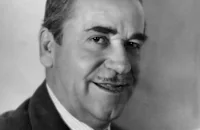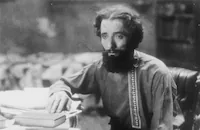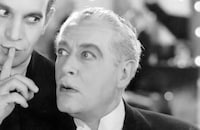Golden Dawn
Brief Synopsis
Cast & Crew
Ray Enright
Walter Woolf
Vivienne Segal
Noah Beery
Alice Gentle
Lupino Lane
Film Details
Technical Specs

Synopsis
Dawn, a young white girl who has been kidnaped in infancy and reared by Mooda, an African woman who operates a canteen in the German cantonment, meets and falls in love with Tom Allen, an English rubber planter who is a prisoner of war. Shep Keyes, who has joined the German troops, covets her but realizes he cannot possess her because she is betrothed to the tribal god, Mulunghu. On the eve of the ceremony, he learns of her love for Tom. Tom, meanwhile, is sent back to England, and when the English take the territory from the Germans, Shep tries to incite the natives, who are experiencing a drought, against Dawn because of her love of a mortal. Tom learns from Mooda that Dawn was stolen from a white trader and finds her seeking refuge in a convent. Shep arouses the natives, but Dawn declares her faith in the white man's God, and a thunderstorm brings relief to the parched land, after which Tom claims her for his bride.

Director
Ray Enright
Cast
Walter Woolf
Vivienne Segal

Noah Beery
Alice Gentle
Lupino Lane
Marion Byron
Lee Moran

Nigel De Brulier
Otto Matieson
Dick Henderson
Nina Quartaro
Sojin
Julanne Johnston
Nick De Ruiz

Edward Martindel
Crew

Film Details
Technical Specs

Articles
Golden Dawn
For something so terrible, Golden Dawn (1930) has a remarkable pedigree. Wouldn't a Broadway play from the lyricist that had just written Show Boat (1927), often considered the first great American musical, be a sure bet? That lyricist, Oscar Hammerstein II, wrote Golden Dawn to open Hammerstein's Theatre in New York, a theatre named after his own father, where the play ran for 184 performances. So much luck was connected to the whole venture that a minor cast member, Archie Leach, making his Broadway debut, went on to Hollywood and became the star Cary Grant.
Naturally Warner Brothers, the studio where sound first met cinema, couldn't be blamed for snapping up the property. However, someone in the New York office really should have gone to see the thing first. Golden Dawn is a Viennese-style operetta, not necessarily a bad thing or terribly unusual onscreen in the early talkie days, but this one is set in the jungles of East Africa! British soldiers clash with African natives while singing at the top of their lungs.
Then there's the casting. Broadway import Vivienne Segal would seem to be a natural but at thirty-three cannot pass for a teenager or someone who believes herself to be black - she's a blond, white woman, after all! You will understand why she would be so confused, however, when you catch sight of some of the natives. Her African "mother" is played by Alice Gentle, wearing a thin patina of slightly dark makeup while warbling the opening song "Africa Smiles No More." Africa would smile a lot less at Noah Beery's performance as the African slave master "Shep" Keyes who wears blackface so badly it visibly drips off his face under the hot studio lights and who attempts an authentic African accent by talking like he just fled a Southern plantation. If that isn't outrageous enough, his big song is a declaration of love...to his whip!
Warner Brothers filmed this monstrosity as a two-strip Technicolor special release for the summer of 1930 but, even then, audiences knew a stinker when they saw it. Come the Golden Dawn, Warners had not only suffered a disaster, they also helped kill off the vogue for musicals that was to remain buried until the studio revived it with 42nd Street (1933). With no interest in preservation, all of the two-strip Technicolor prints have long vanished, forcing us to show it in black-and-white. Not to worry, none of the movie's laughable inaccuracies and garish melodramatics has been diminished in any way.
Director: Ray Enright
Screenplay: Walter Anthony, based on the operetta by Otto Harbach and Oscar Hammerstein II
Cinematography: Dev Jennings, Frank Good
Songs: Oscar Hammerstein II, Otto Harbach, Emmerich Kalman, Herbert Stothart
Cast: Walter Woolf (Tom Allen), Vivienne Segal (Dawn), Noah Beery (Shep Keyes), Alice Gentle (Mooda), Lupino Lane (Pigeon), Marion Byron (Johanna).
BW-82m.
by Brian Cady

Golden Dawn
Quotes
Trivia
The operetta opened in New York on 30 November 1927 and had 184 performances.













